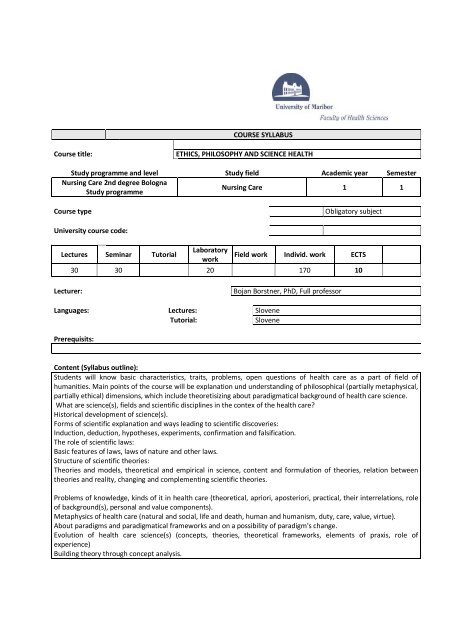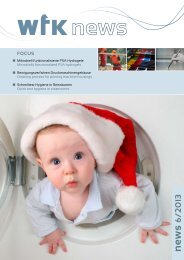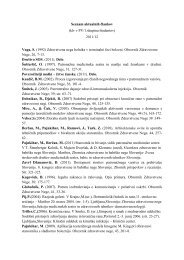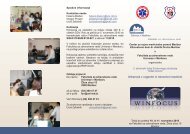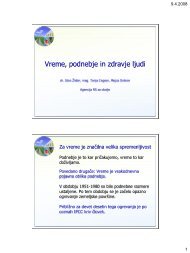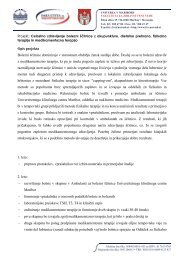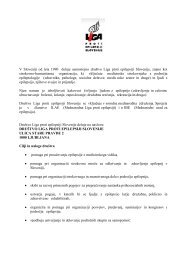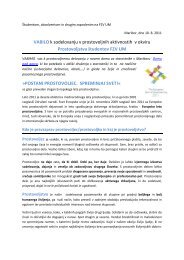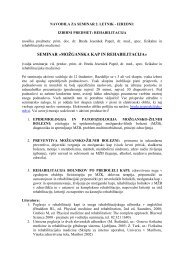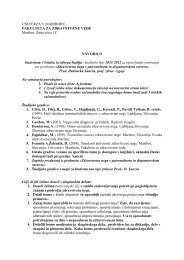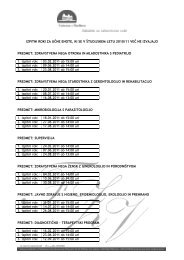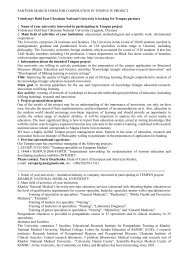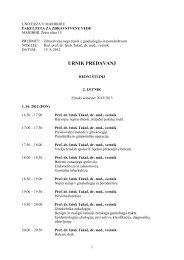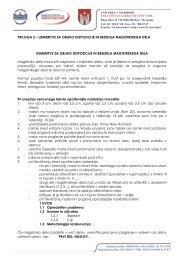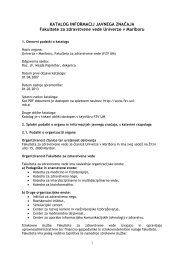nursing care 2nd degree bologna study programm - Fakulteta za ...
nursing care 2nd degree bologna study programm - Fakulteta za ...
nursing care 2nd degree bologna study programm - Fakulteta za ...
You also want an ePaper? Increase the reach of your titles
YUMPU automatically turns print PDFs into web optimized ePapers that Google loves.
COURSE SYLLABUS<br />
Course title: ETHICS, PHILOSOPHY AND SCIENCE HEALTH<br />
Study <strong>programm</strong>e and level Study field Academic year Semester<br />
Nursing Care <strong>2nd</strong> <strong>degree</strong> Bologna<br />
Study <strong>programm</strong>e<br />
Nursing Care 1 1<br />
Course type Obligatory subject<br />
University course code:<br />
Lectures Seminar Tutorial<br />
Laboratory<br />
work<br />
Field work Individ. work ECTS<br />
30 30 20 170 10<br />
Lecturer: Bojan Borstner, PhD, Full professor<br />
Languages: Lectures: Slovene<br />
Tutorial: Slovene<br />
Prerequisits:<br />
Content (Syllabus outline):<br />
Students will know basic characteristics, traits, problems, open questions of health <strong>care</strong> as a part of field of<br />
humanities. Main points of the course will be explanation und understanding of philosophical (partially metaphysical,<br />
partially ethical) dimensions, which include theoretisizing about paradigmatical background of health <strong>care</strong> science.<br />
What are science(s), fields and scientific disciplines in the contex of the health <strong>care</strong>?<br />
Historical development of science(s).<br />
Forms of scientific explanation and ways leading to scientific discoveries:<br />
Induction, deduction, hypotheses, experiments, confirmation and falsification.<br />
The role of scientific laws:<br />
Basic features of laws, laws of nature and other laws.<br />
Structure of scientific theories:<br />
Theories and models, theoretical and empirical in science, content and formulation of theories, relation between<br />
theories and reality, changing and complementing scientific theories.<br />
Problems of knowledge, kinds of it in health <strong>care</strong> (theoretical, apriori, aposteriori, practical, their interrelations, role<br />
of background(s), personal and value components).<br />
Metaphysics of health <strong>care</strong> (natural and social, life and death, human and humanism, duty, <strong>care</strong>, value, virtue).<br />
About paradigms and paradigmatical frameworks and on a possibility of paradigm's change.<br />
Evolution of health <strong>care</strong> science(s) (concepts, theories, theoretical frameworks, elements of praxis, role of<br />
experience)<br />
Building theory through concept analysis.
Introduction to <strong>nursing</strong> theories.<br />
Choosing theory for practice.<br />
Applying theories in practice.<br />
Theory and research: the relationship.<br />
Analysis and critique of health <strong>care</strong> science(s).<br />
Professional development (professional identity in health <strong>care</strong>; values and values system, gender problems).<br />
Bases for critical evaluation of health <strong>care</strong> science(s).<br />
Readings:<br />
Alfaro-LeFevre R. Critical thinking and clinical judgment. A practical approach. 3rd edition. Philadelphia: Saunders,<br />
2004.<br />
Boorse, Christopher (1975) “On the Distinction Between Disease and Illness”. Philosophy and Public Affairs, 5: 49-68.<br />
Boorse, Christopher (1977) “Health as a Theoretical Concept”. Philosophy of Science, 44: 542-573.<br />
Boyd, R., Gasper, P., Trout, J. D. (ur.) (1991): The Philosophy of Science, The MIT Press, Cambridge.<br />
Buchanan, A. Justice and Health Care. Oxford: OUP. 2009.<br />
Recomended:<br />
Klampfer, F. (et al.) Telovadnica <strong>za</strong> možgane. Maribor: Svarog 2008.<br />
Okasha, S. Filozofija znanosti. Ljubljana: Krtina. 2008.<br />
Prado, C. C. Choosing to Die. Cambridge: CUP. 2008.<br />
Risjord, M. Nursing knowledge: Science, Practice, and Philosophy. London: Willey-Blackwell, 2010<br />
Izbor/Reader iz aktualnih knjig in revij o teoriji, filozofiji, etiki zdravstva.<br />
Objectives and competences:<br />
The objective of this course is to evolve philosophical competence and argumentative capacities by understanding<br />
problems of contemporary sciences (natural and social) and by discussing their solutions based on a critical<br />
evaluation of proposed answers and on a search for autonomous and original solutions.<br />
Students are competent for the implementation of philosophical critical elements gained in the due course to the<br />
modern clinical practise.<br />
Communication skills: oral expression at oral exam, writing expression at completing a seminar, writing expression at<br />
doing house works, oral expression at collaborating in a discussion, presentation.<br />
· Use of information technology: search for relevant information on the internet.<br />
· Problem solving: scientific-philosophical problems.<br />
Intended learning outcomes:<br />
On completion of this course the student will be able to:<br />
· Knowledge and understanding:<br />
- Identify underlying issues in all kinds of debates, express and formulate complex and controversial problems<br />
precisely.<br />
· Use and analysis:<br />
- Analyze and construct sound arguments and recognize logical fallacies, methodological errors, rhetorical devices or<br />
unexamined conventional wisdom, invent or discover cases to support or challenge a position, and distinguish those<br />
that are relevant from those that are not.<br />
· Synthesis and evaluation:<br />
- critically examine and independently formulate the best arguments for variety of positions and look for their<br />
weakest parts, evaluate views and arguments of others tolerantly and conceptualize her own theoretical activity.<br />
Transferable/Key Skills and other attributes:<br />
Communication skills:<br />
oral expression at oral exam, writing expression at completing a seminar, writing expression at doing house works,<br />
oral expression at collaborating in a discussion, presentation.<br />
· Use of information technology: search for relevant information on the internet.<br />
· Problem solving: scientific-philosophical problems.
Learning and teaching methods:<br />
Lectures,<br />
A seminar with a discussion,<br />
Presentations of essays.<br />
At least 80% per cent participation is required at the seminars.<br />
Assessment:<br />
Oral examination<br />
Final essay<br />
Short esseys<br />
Weight (in %)<br />
40<br />
40<br />
20<br />
Lecturer's references:<br />
BORSTNER, Bojan. Lewis against Armstrong : a case of truth makers. V: The 9th Symposium "Contemporary<br />
philosophical issues", Rijeka, 14.-15. 6. 2007 : [abstracts]. Rijeka: Croatian Society of Analytical Philosophy: University,<br />
Faculty of Philosophy, 2007, [1] str.<br />
BORSTNER, Bojan, GARTNER, Smiljana. The conceptual analysis of assimilatio nandintegration. V: CARVALHO,<br />
Joaquim (ur.). Religion and power in Europe : conflict and convergence, (Thematic work group, Religious and<br />
philosophical concepts, 3, 2). Pisa: Edizioni Plus - Pisa University Press, 2007, str. [1]-14.<br />
ARAÚJO, Ana Cristina, D'APRILE, Iwan-Michelangelo, BORSTNER, Bojan, GARTNER, Smiljana. The historical and<br />
philosophical dimension sof the concept of tolerance. V: HÁLFDANARSON, Gudmundur (ur.). Discrimination and<br />
tolerance in historical perspective, (Transversal theme, Discrimination and tolerance). Pisa: Edizioni Plus, cop. 2008,<br />
str. [1]-18.
COURSE SYLLABUS<br />
Course title: RESEARCH AND RESEARCH METHODOLOGY<br />
Study <strong>programm</strong>e and level Study field Academic year Semester<br />
Nursing Care <strong>2nd</strong> <strong>degree</strong> Bologna<br />
Study Programme<br />
Nursing Care 1 1<br />
Course type Obligatory subject<br />
University course code:<br />
Lectures Seminar Tutorial<br />
Laboratory<br />
work<br />
Field work Individ. work ECTS<br />
30 30 15 175 10<br />
Lecturer: Peter Kokol, PhD, Full professor<br />
Languages: Lectures: slovenski<br />
Tutorial: slovenski<br />
Prerequisits:<br />
Content (Syllabus outline):<br />
The student gets familiar with methodological issues and process of scientific research especially qualitative and<br />
quantitative research, and triangulation and the transfer of research results into practice.<br />
This module aims to prepare students for the practice of undertaking high quality research in health and <strong>nursing</strong> <strong>care</strong>.<br />
They will upgrade their knowledge about principles of profesional research ethics and became aware of specific<br />
questions which appears on the field of health sciences and <strong>nursing</strong>..<br />
Readings:<br />
Melnyk BM, Fineout-Overholt E. Evidence-based practice in <strong>nursing</strong> and health<strong>care</strong>. A guide to best practice.<br />
Philadelphia: Lippincott Williams & Wilkins, 2005.<br />
Nursing research : a qualitative perspective / [edited by] Patricia L. Munhall. - 3rd ed. - Sudbury, Mass. : Jones and<br />
Bartlett Publishers, cop. 2001.<br />
Gerrish K, Lacey A., The Research Process in Nursing, 2006<br />
Parahoo K, Nursing Research: Principles, Process and Issues, <strong>2nd</strong> ed. Palgrave Macmillan, 2006<br />
Ellis P., Understanding research for <strong>nursing</strong> students, Learning Matters, 2010
Objectives and competences:<br />
Student:<br />
- Is acquainted with research paradigms and research approaches which inform <strong>nursing</strong> and health<strong>care</strong> practice;<br />
- and recognizes significance and characteristics of research work and research for <strong>nursing</strong>;<br />
On success ful completion of this module students should be able to:<br />
Develop an expertise in qualitative and quantitative research design, with particular reference to issues of<br />
sampling, access, ethics and rigour.<br />
Become skilled in the use of a range of techniques for the collection and analysis of qualitative and quantitative<br />
data.<br />
Develop the knowledge and skills essential for the effective dissemination and evaluation of qualitative and<br />
quantitative research.<br />
Intended learning outcomes:<br />
Knowledge and Understanding:<br />
- Knowledge of research methodology and different research approaches;<br />
-Qualified for independent quantitative and qualitative research;<br />
Learning and teaching methods:<br />
Lectures, seminars, computer hands on lessons.<br />
At least 80% per cent participation is required at the seminars.<br />
Assessment:<br />
Weight (in %)<br />
Project 100<br />
Lecturer's references:<br />
POVALEJ, Petra, KRAVOS, Matej, KOKOL, Peter. Intelligent data analysis for diagnostics of alcohol dependecy. V:<br />
KOKOL, Peter (ur.), PODGORELEC, Vili (ur.), MIČETIĆ-TURK, Dušanka (ur.), ZORMAN, Milan (ur.), VERLIČ, Mateja (ur.).<br />
Twentieth IEEE International Symposium on Computer-Based MedicalSystems, 20-22 June 2007, Maribor, Slovenia.<br />
Proceedings, (Proceedings - IEEE Symposium on Computer-Based Medical Systems). Los Alamitos (CA); Washington;<br />
Tokyo: IEEE Computer Society, cop. 2007, str. 445-450.<br />
ŠTIGLIC, Gregor, KOKOL, Peter. Effectiveness of rotation forest in meta-learning based gene expression classification.<br />
V: KOKOL, Peter (ur.), PODGORELEC, Vili (ur.), MIČETIĆ-TURK, Dušanka (ur.), ZORMAN, Milan (ur.), VERLIČ, Mateja<br />
(ur.). Twentieth IEEE International Symposium on Computer-Based Medical Systems, 20-22 June 2007, Maribor,<br />
Slovenia. Proceedings, (Proceedings - IEEE Symposium on Computer-Based Medical Systems). Los Alamitos (CA);<br />
Washington; Tokyo: IEEE Computer Society, cop. 2007, str. 243-248.<br />
ŠTIGLIC, Gregor, KOCBEK, Simon, PERNEK, Igor, KOKOL, Peter. Comprehensive decision tree models in<br />
bioinformatics. PLoS one, 2012, vol. 7, iss. 3, str. [1-14], e33812<br />
KRIŽMARIĆ, Miljenko, VERLIČ, Mateja, ŠTIGLIC, Gregor, GRMEC, Štefek, KOKOL, Peter. Intelligent analysis in predicting<br />
outcome of out-of-hospital cardiac arrest. Comput. methods programs biomed.. [Print ed.], 2009, vol. 95, no. Suppl.<br />
1, str. S22-S32, doi:
COURSE SYLLABUS<br />
Course title: THEORIES, CONCEPTS AND PRACTICE OF NURSING<br />
Study <strong>programm</strong>e and level Study field Academic year Semester<br />
Nursing <strong>care</strong> 2 nd <strong>degree</strong> Bologna Study<br />
Programme<br />
Nursing <strong>care</strong> 1 1<br />
Course type Obligatory subject<br />
University course code:<br />
Lectures Seminar Tutorial<br />
Laboratory<br />
work<br />
Clinical work Individ. work ECTS<br />
30 50 30 10<br />
Lecturer: Majda PAJNKIHAR, PhD, Assistant professor<br />
Languages: Lectures: Slovene<br />
Tutorial: Slovene<br />
Prerequisits:<br />
There are no conditions for inclusion for lecturers<br />
Content (Syllabus outline):<br />
Science and discipline of <strong>nursing</strong>;<br />
Development science of <strong>nursing</strong>;<br />
Nursing' fundamental patterns of knowing,<br />
Interpreative paradigm;<br />
Profession, practice and art of <strong>nursing</strong>;<br />
The characteristic of <strong>nursing</strong> profession;<br />
Development the theory of <strong>nursing</strong>,<br />
Theories and conceptual models;<br />
Nursing theory analysis,<br />
The criteria for theory analysis;<br />
The importance of theory on practice of <strong>nursing</strong>;<br />
Criteria for theory application;<br />
Concepts of <strong>nursing</strong>;<br />
Criteria for concept analysis;<br />
Selection the theory for practice;<br />
Integration of theory, practise and reserach.
Readings:<br />
Alligood, M R, Tomey, A M (2010). Nursing Theorists and Their Work. 7th edition. Missouri: Mosby Elsevier.<br />
Alligood, MR (2010). Nursing Theory. Utili<strong>za</strong>tion & Application. 4th edition. St. Louis: Mosby, Elsevier.<br />
Chinn, P L, Kramer, M K (2011). Integrated Knowledge Development in Nursing. 8th edition. St. Louis: Elsevier<br />
Mosby.<br />
Cutcliffe, J R, McKenna, H P (2005).The Essential Concepts of Nursing. Edinburgh: Elsevier Churchill Livingstone.<br />
Fawcett, J (2005). Contemporary Nursing Knowledge. Analysis and Evaluation of Nursing Models and Theories.<br />
<strong>2nd</strong> edition. Philadelphia: F.A. Davis Company<br />
Johnson, BM, Webber, P, B (2010). An Introduction to Theory and Reasoning in Nursing. 3rd Edition. Philadelphia:<br />
Wolters Kluwer/Lippincott Williams˛&Wilkins.<br />
Recomended:<br />
McKenna, HP (1997). Nursing theories and Models. Routlrdge Essentials for Nurses. London: Routledge.<br />
McKenna, H P, Slevin, O D (2008). Vital notes for nurses. Nursing Models, Theories and Practice. Oxford:<br />
Blackweel Publishing.<br />
Meleis, AI (2012). Theoretical Nursing. Development&progress. 5th edition. Philadelphia: Wolters<br />
Kluwer/Lippincott Williams˛&Wilkins.<br />
Objectives and competences:<br />
Student will get familiar with <strong>nursing</strong> theories and concepts and their analysis and evaluation,<br />
Student is capable to understand the connection between theory and practice and selection and application<br />
theory in practice<br />
Seminar work is formed in the form of an article<br />
Intended learning outcomes:<br />
Knowledge and Understanding:<br />
Theoretical and kritical reasoning and aplication the knowledge of science and art in practice<br />
Clear understanding of <strong>nursing</strong> as profession and as discipline<br />
Transferable/Key Skills and other attributes:<br />
An ability to understand and explain science and art of <strong>nursing</strong>.<br />
Learning and teaching methods:<br />
Lecturers<br />
Seminars: group work<br />
At least 80% per cent participation is required at the seminars.<br />
Assessment:<br />
Oral exam<br />
Seminar paper and oral presentation<br />
Weight (in %)<br />
60%<br />
40%
Lecturer's references:<br />
1. PAJNKIHAR, Majda. Nurses' (un)partner-like relations hipswith clients. Nurs. ethics, 2009, vol. 16, no. 1, str.<br />
43-56. [COBISS.SI-ID 1443492], [JCR, WoS, št. citatov do 6. 8. 2011: 3, brez avtocitatov: 3, normirano št.<br />
citatov: 13]<br />
2. BUTTERWORTH, Tony, BELL, Louise, JACKSON, Christine Ann, PAJNKIHAR, Majda. Wickedspell or magic<br />
bullet? A review of the clinical supervision literature 2001-2007. Nurse education today, 2008, vol. 28, no. 3,<br />
str. 264-272. [COBISS.SI-ID 1423524], [JCR, WoS, št. citatov do 6. 1. 2011: 0, brez avtocitatov: 0, normirano<br />
št. citatov: 0]<br />
3. PAJNKIHAR, Majda. Is caring a lostart in <strong>nursing</strong>?. Int. j. nurs. studies. [Printed.], 2008, vol. 45, no. 5, str. 807-<br />
808. [COBISS.SI-ID 1406372], [JCR, WoS, št. citatov do 9. 12. 2008: 1, brez avtocitatov: 1, normirano št.<br />
citatov: 4]
COURSE SYLLABUS<br />
Course title: HEALTH PROMOTION AND PRIMARY HEALTH CARE<br />
Study <strong>programm</strong>e and level Study field Academic year Semester<br />
Nursing Care<strong>2nd</strong> <strong>degree</strong> Bologna<br />
Study Programme<br />
Nursing Care 1 2<br />
Course type Obligatory subject<br />
University course code:<br />
Lectures Seminar Tutorial<br />
Laboratory<br />
work<br />
Fieldwork Individ. work ECTS<br />
30 40 180 10<br />
Lecturer: Cirila Hlastan Ribič, PhD, Assistant professor<br />
Languages: Lectures: English and Slovene<br />
Tutorial: English and Slovene<br />
Prerequisits:<br />
Content (Syllabus outline):<br />
Student gets familiar with different health systems in Europe due to cultural differences.<br />
Get familiar with the influence with World Health Organi<strong>za</strong>tion and International Council of Nurses on the<br />
development of health <strong>care</strong> system in Europe.<br />
Recognize the methods of health promotion and methodologies of performing promotion in different social systems.<br />
Get familiar with cultural differences witch influence the way of promotion.<br />
- aspects of health and the importance of health for the community,<br />
- promotion of health and its characteristics,<br />
- activities for the promotion of health,<br />
- the effects of one's behavior on health;<br />
- Psychology of health, illness and patient;<br />
- Prevention in health <strong>care</strong> system<br />
Readings:<br />
Wills Jane. Promoting health, Oxford, Malden : Blackwell Pub., 2007.<br />
Kiger MA. Teaching for health. London: Elsevier, 2004.<br />
Mavilee JA, Huerta CG. Health promotion in <strong>nursing</strong>. CENGAGE. Delmar Learning, 2007.<br />
Health promotion and health education.Maribor:Kolaborativni center SZO <strong>za</strong> primarno zdravstveno nego, Lemon,<br />
Maribor 1996.<br />
Zaletel-Kragelj, Eržen Ivan, Premik Marjan. Uvod v javno zdravje. Medicinska fakulteta, Ljubljana, 2007
Objectives and competences:<br />
Students:<br />
- Get knowledge about social process in health <strong>care</strong>;<br />
- recognize the meaning of illness prevention and consideration of meaning of prevention;<br />
- get familiar with the values of health and roles of individuals, family, local community and society in<br />
strengthening and maintaining health;<br />
- get familiar with tasks and roles of health <strong>care</strong> providers in health promotion;<br />
- get familiar with applicative connection between theory and practice;<br />
Intended learning outcomes:<br />
Knowledge and Understanding:<br />
- Student recognizes and understands the basic determinants of health.<br />
- Recognize the basic public health problems among the population<br />
Transferable/Key Skills and other attributes:<br />
- Is capable to form the actual educational health promotional programs in <strong>nursing</strong> <strong>care</strong> and primary health<br />
<strong>care</strong>.<br />
Learning and teaching methods:<br />
Teaching methods:<br />
- systematic lectures<br />
- dialogue<br />
- practice<br />
Learning methods:<br />
- abstractive conceptuali<strong>za</strong>tion<br />
- concrete experience<br />
- active experimentation<br />
At least 80% per cent participation is required at the seminars.<br />
Assessment:<br />
Written exam<br />
Seminar<br />
Weight (in %)<br />
60<br />
40<br />
Lecturer's references:<br />
MAUČEC ZAKOTNIK, Jožica, ŠTERN, Bojanka, HLASTAN-RIBIČ, Cirila, LUZNAR, Nedeljka. Nacionalni program<br />
preprečevanja kroničnih bolezni v Sloveniji - sistemski pristop v odkrivanju in obravnavi ogroženih populacij =<br />
National <strong>programm</strong>e for the prevention of chronic diseases in Slovenia – systematic approach to the prevention and<br />
treatment of population at risk of NCD. V: GREGORIČ, Alojz (ur.). Zbornik. Maribor: Splošna bolnišnica, 2006, str. 211-<br />
218.<br />
HLASTAN-RIBIČ, Cirila. Zdrava prehrana kot temelj zdravja. V: HLASTAN-RIBIČ, Cirila (ur.). Cvahtetovi dnevi javnega<br />
zdravja 2010, Ljubljana, oktober 2010. Zdrava prehrana in javno zdravje : zbornik prispevkov. Ljubljana: Medicinska<br />
fakulteta, Katedra <strong>za</strong> javno zdravje, 2010, str. 5-26.<br />
DJOMBA, Janet Klara, VERTNIK, Lidija, ZALETEL-KRAGELJ, Lijana, MAUČEC ZAKOTNIK, Jožica, HLASTAN-RIBIČ, Cirila.
Prehranske navade kot dejavnik tveganja <strong>za</strong> kronične nalezljive bolezni. V: HLASTAN-RIBIČ, Cirila (ur.). Cvahtetovi<br />
dnevi javnega zdravja 2010, Ljubljana, oktober 2010. Zdrava prehrana in javno zdravje : zbornik prispevkov. Ljubljana:<br />
Medicinska fakulteta, Katedra <strong>za</strong> javno zdravje, 2010, str. 69-84.<br />
HLASTAN-RIBIČ, Cirila, MAUČEC ZAKOTNIK, Jožica, VERTNIK, Lidija, VEGNUTI, Miljana, CAPPUCCIO, Francesco. Salt<br />
intake of the Slovene population assessed by 24 h urinary sodium excretion. Public health nutr. (Wallingford), 2010,<br />
letn. 13, št. 11, str. 1803-1809.<br />
http://journals.cambridge.org/action/displayAbstract?fromPage=online&aid=7914879, doi:<br />
10.1017/S136898001000025X. [COBISS.SI-ID 2328037], [JCR]<br />
KOBE, Helena, ŠTIMEC, Matevž, HLASTAN-RIBIČ, Cirila, FIDLER MIS, Nataša. Food intake in Slovenian adolescents and<br />
adherence to the Optimized Mixed Diet : a nationally representative <strong>study</strong>. Public health nutr. (Wallingford), 2011,<br />
vol. , no. , str., doi: 10.1017/S1368980011002631. [COBISS.SI-ID 2575077], [JCR]
UČNI NAČRT PREDMETA / COURSE SYLLABUS<br />
Course title: MANAGEMENT AND ECONOMICS IN HEALTH CARE<br />
Study <strong>programm</strong>e and level Study field Academic year Semester<br />
Zdravstvena nega Zdravstvena nega 1 2<br />
Nursing Care <strong>2nd</strong> <strong>degree</strong> Bologna<br />
Study <strong>programm</strong>e<br />
Nursing Care 1 2<br />
Course type Optional subject<br />
University course code:<br />
Lectures Seminar Tutorial<br />
Laboratory<br />
work<br />
Field work Individ. work ECTS<br />
30 30 190 10<br />
Lecturer: Jure Kovač , PhD, Full professor<br />
Languages: Lectures: slovene<br />
Tutorial: slovene<br />
Prerequisits:<br />
Content (Syllabus outline):<br />
a) Management of not-profitable organisations with the following topics: target management and<br />
administration, planning in not-profitable organisations, performing and coordination of tasks in notprofitable<br />
organisations, control of achieving the objects in not-profitable organisations.<br />
b) Economics in health <strong>care</strong> with the following topics: categories of operation efficiency, categories of<br />
effectiveness, flate costs of business operation, variable costs of business operation, efficiency ratios.<br />
c) Marketing in health <strong>care</strong> with the following topics: marketing concept and system, marketing management,<br />
marketing process, marketing environment, marketing research, communications in marketing.<br />
d) Management of human sources with the following topics: comprehension of human sources, planning of<br />
human sources, human sources and management, human sources and development.<br />
Readings:<br />
1. Rozman R., Kovač, J. (2012), Manangement. Ljubljana, GV.<br />
2. Možina, S. (ured.) in drugi (2005), Management; Nova znanja <strong>za</strong> uspeh. Ljubljana, Didakta (izbrana poglavja).<br />
3. Rebernik, M. (2008), Ekonomika podjetja. Ljubljana, Gospodarski vestnik.<br />
4. Treven, S. (1998). Management človeških virov. Ljubljana. Gospodarski vestnik.<br />
5. Kotler, P. , Andreasen, A.R. (1995). Strategic Marketing for Non-Profit Organi<strong>za</strong>tions, Prentice-Hall.
Objectives and competences:<br />
The basic goal of the subject is to qualify the students for understanding of single categories on the all mentioned<br />
complexes. Adequate to that are also the partial objectives, which cover the topics within single complexes.<br />
Intended learning outcomes:<br />
Knowledge and understanding:<br />
The students obtain the knowledge which will be of essential use for understanding of not-profitable organisation of<br />
health <strong>care</strong> operation. Single specific methods within single complexes will qualify the students for practical<br />
performing of tasks, connected regarding the system itself as also for acting of the system in its environment.<br />
Learning and teaching methods:<br />
Teaching methods:<br />
- systematic lectures<br />
- dialogue<br />
- practice<br />
Learning methods:<br />
- abstractive conceptuali<strong>za</strong>tion<br />
- concrete experience<br />
- active experimentation<br />
At least 80% per cent participation is required at the seminars.<br />
Assessment:<br />
Assessment in seminars (assessment of the<br />
group and individuals),<br />
Written or oral exam<br />
Course work<br />
Weight (in %)<br />
60<br />
40<br />
Lecturer's references:<br />
KOVAČ, Jure. Uvod v preučevanje razvoja projektnega managementa v našem okolju. Proj. mreža Slov., dec. 2007,<br />
letn. 10, št. 3, str. 11-16.<br />
MAZE, Hilda, KOVAČ, Jure, BOHINC, Marija. Model organiziranja zdravstvene nege v Splošni bolnišnici Celje. V:<br />
RAJKOVIČ, Vladislav (ur.), KERN, Tomaž (ur.), KLJAJIĆ, Miroljub (ur.), LESKOVAR, Robert (ur.), MAYER, Janez (ur.),<br />
VUKOVIČ, Goran (ur.). Ustvarjalna organi<strong>za</strong>cija : zbornik 26. mednarodne konference o razvoju organi<strong>za</strong>cijskih<br />
znanosti, Slovenija, Portorož, 28.-30. marec 2007 = proceedings of the 26th International Conference on<br />
Organi<strong>za</strong>tional Science Development, Slovenia, Portorož, March, 28th-30th, 2007. Kranj: Moderna organi<strong>za</strong>cija, 2007,<br />
str. 1142-1148.<br />
KOVAČ, Jure, JESENKO, Manca. The connection between trust and leadership styles in Slovene organi<strong>za</strong>tions. J. East<br />
Eur. manag. stud., 2010, vol. 15, no. 1, str. 9-33, tabele, graf. prikazi.
COURSE SYLLABUS<br />
Course title: SOCIAL, PSYCHOLOGICAL AND LAW QUESTIONS IN NURSING CARE<br />
Study <strong>programm</strong>e and level Study field Academic year Semester<br />
Nursing Care <strong>2nd</strong> <strong>degree</strong> Bologna<br />
Study Programme<br />
Nursing Care 1 2<br />
Course type Optional subject<br />
University course code:<br />
Lectures Seminar Tutorial<br />
Laboratory<br />
work<br />
Fieldwork Individ. work ECTS<br />
30 30 190 10<br />
Lecturer: Su<strong>za</strong>na Kraljić, PhD, Assistant professor<br />
Languages: Lectures: slovene<br />
Tutorial: slovene<br />
Prerequisits:<br />
Content (Syllabus outline):<br />
The subject include sociological, psychological and legal question’s in <strong>nursing</strong>.<br />
The contents of sociological subjects, which include the theoretical conceptualisation of the sociological<br />
understanding of the family and partner life, life of children, young and elderly people, health and diseases, death,<br />
forms of aggressive and socially not adequate behaviour, that as individual or as a member of the partner<br />
respectively/and or family community experiences, considers modern approaches of social disciplines as well as social<br />
history of the family and partner life and the life of elderly people and their social applications in the up-to-date postmodern<br />
society.<br />
Sociological questions in <strong>nursing</strong> <strong>care</strong>:<br />
1. Sociological questions of health, disease and death<br />
2. Sociology of deviations and dependence<br />
3. Sociology of the family, children and elderly people<br />
4. Sociology of the partner life<br />
5. Sociological, cultural and historical views of family and sexual life<br />
Psychological questions:<br />
- genetic and social influence on development of personality;<br />
- structure and dynamics of personality;<br />
- emotions ;<br />
- motivation;
- frustrations, conflicts, defence mechanisms;<br />
- stress and relaxation;<br />
- anxiety and burn- out syndrome;<br />
- characteristics of different development stages;<br />
- social process in <strong>nursing</strong> <strong>care</strong>;<br />
- psychology of groups;<br />
- team work;<br />
- communication with patients, relatives and co-workers;<br />
- Nonverbal communication;<br />
- Psychology of health, illness and patient;<br />
Legal questions:<br />
Human and patients rights<br />
Proceedings for protection of patients rights<br />
Types of liabilities of health workers/co-workers<br />
Basics of criminal law<br />
Basics of succession law<br />
Other relevant chapters from chosen law act, which with its contents interfere on the health law<br />
Readings:<br />
BALAŽIC et al: Zakon o pacientovih pravicah s komentarjem.<br />
KRALJIĆ, Su<strong>za</strong>na. Pravica otroka do privolitve oziroma odklonitve medicinskega posega. Podjet. delo, 2003, let. 29, št.<br />
5, str. 924-939.<br />
KRALJIĆ, Su<strong>za</strong>na. Pravica otroka do zdravja : mednarodna in domača (ne)sporna razmerja?. V: BRUMEN, Marina (ur.),<br />
ŽELEZNIK, Danica (ur.), PIRŠ, Ksenija (ur.). Kakovost v zdravstveni in babiški negi - odgovorni, kompetentni in inovativni<br />
<strong>za</strong>posleni : zbornik predavanj in posterjev 2. Znanstvenega simpozija z mednarodno udeležbo. Maribor: Društvo<br />
medicinskih sester, babic in zdravstvenih tehnikov, 2009, str. 99-108.<br />
KRALJIĆ, Su<strong>za</strong>na. Obrezovanje deklic : kršitev pravic ali kulturna raznolikost?. Zbornik Pravne fakultete Univerze v<br />
Mariboru, 2010, letn. 6, str. 161-178.<br />
KRALJIĆ, Su<strong>za</strong>na. Pravni vidiki odgovornosti v fizioterapiji = Legal views of the responsibility in the physiotherapy. V:<br />
JANKOVIČ, Patricija (ur.). Zbornik izbranih referatov z recenzijami. Maribor: Evropsko središče, 2011, str. 60-70.<br />
Recomended:<br />
KRALJIĆ, Su<strong>za</strong>na. Predstavitev <strong>za</strong>kona o pacientovih pravicah s poudarkom na omejitvi avtonomije pacienta. V:<br />
KOKOL, Peter (ur.), RIJAVEC, Vesna (ur.), KOLENC, Ljudmila (ur.), REBERŠEK GORIŠEK, Jelka (ur.). Pacientove pravice in<br />
dolžnosti : zbornik predavanj z recenzijo. 1.0. Maribor: <strong>Fakulteta</strong> <strong>za</strong> zdravstvene vede, 2009, str. 9-21.<br />
KRALJIĆ, Su<strong>za</strong>na. Pravna ureditev pacientovih pravic in njihovo uveljavljanje po ZPacP. V: PIRŠ, Ksenija (ur.).<br />
Zdravstvena <strong>za</strong>konodaja v luči zdravstvene nege : obvezne vsebine "Zakonodaja s področja zdravstva". Maribor:<br />
Društvo medicinskih sester, babic in zdravstvenih tehnikov, 2009, str. 40-57.<br />
KRALJIĆ, Su<strong>za</strong>na. Nekateri vidiki pacientove avtonomije = Some views of patient's autonomy. V: RIJAVEC, Vesna (ur.),<br />
REBERŠEK GORIŠEK, Jelka (ur.), FLIS, Vojko (ur.), PLANINŠEC, Viktor (ur.), KRALJIĆ, Su<strong>za</strong>na (ur.). Medicina in pravo :<br />
sodobne dileme II. Maribor: Pravna fakulteta: Zdravniško društvo, 2010, str. 187-199.<br />
RIJAVEC, Vesna. Varstvo osebnih podatkov. V: KOKOL, Peter (ur.), RIJAVEC, Vesna (ur.), KOLENC, Ljudmila (ur.),<br />
REBERŠEK GORIŠEK, Jelka (ur.). Pacientove pravice in dolžnosti : zbornik predavanj z recenzijo. 1.0. Maribor: <strong>Fakulteta</strong><br />
<strong>za</strong> zdravstvene vede, 2009, str. 30-40.<br />
RIJAVEC, Vesna. Dosežki biomedicine - novi izzivi <strong>za</strong> pravnike. V: FLIS, Vojko (ur.), REBERŠEK GORIŠEK, Jelka (ur.),<br />
RIJAVEC, Vesna (ur.), KRALJIĆ, Su<strong>za</strong>na (ur.). Medicina in pravo : izbrana poglavja. 2001, 2002, 2003. Maribor: Splošna<br />
bolnišnica, 2004, str. 65-76.<br />
Objectives and competences:<br />
The students understand the role and dynamic of social and socio-cultural changes and their effects on individual,<br />
partner and family life, the paradox relation to diseases and health and to institutions which are engaged with the<br />
preservation of health and with prevention respectively with healing of diseases. The student get familiar with bio-
psycho-sociological model quality of life, with the health psychology and aging, with the dilemmas of sexual life and<br />
partnership in the life of women and men, with the psychological problems during the hospitali<strong>za</strong>tion and after, with<br />
the therapeutic views of communication and communication with severe patients. The student gets also familiar with<br />
all legal aspects in health system.<br />
Special emphasis is given to the presentation of patient’s rights and to the liability in the health <strong>care</strong> system.<br />
Intended learning outcomes:<br />
Knowledge and Understanding:<br />
Graduates will gain insight into the sociological and psychological relationships in health <strong>care</strong>, especially in the legal<br />
issues they face in their work. Students will gain a detailed knowledge of patients' rights and responsibilities in health<br />
<strong>care</strong>. They will be able to take ethical and legal decisions.<br />
Transferable/KeySkills and other attributes:<br />
The gained knowledge will have a positive impact on their work and they will be able to transfer the knowledge to<br />
other employees<br />
Learning and teaching methods:<br />
Lectures, seminary work.<br />
At least 80% per cent participation is required at the seminars.<br />
Assessment:<br />
Examination<br />
Seminar work<br />
Weight (in %)<br />
70<br />
30<br />
Lecturer's references:<br />
KRALJIĆ, Su<strong>za</strong>na. Pravica otroka do privolitve oziroma odklonitve medicinskega posega. Podjet. delo, 2003, let. 29, št.<br />
5, str. 924-939.<br />
KRALJIĆ, Su<strong>za</strong>na. Pravica otroka do zdravja : mednarodna in domača (ne)sporna razmerja?. V: BRUMEN, Marina (ur.),<br />
ŽELEZNIK, Danica (ur.), PIRŠ, Ksenija (ur.). Kakovost v zdravstveni in babiški negi - odgovorni, kompetentni in inovativni<br />
<strong>za</strong>posleni : zbornik predavanj in posterjev 2. Znanstvenega simpozija z mednarodno udeležbo. Maribor: Društvo<br />
medicinskih sester, babic in zdravstvenih tehnikov, 2009, str. 99-108.<br />
KRALJIĆ, Su<strong>za</strong>na. Obrezovanje deklic : kršitev pravic ali kulturna raznolikost?. Zbornik Pravne fakultete Univerze v<br />
Mariboru, 2010, letn. 6, str. 161-178.<br />
KRALJIĆ, Su<strong>za</strong>na. Pravni vidiki odgovornosti v fizioterapiji = Legal views of the responsibility in the physiotherapy. V:<br />
JANKOVIČ, Patricija (ur.). Zbornik izbranih referatov z recenzijami. Maribor: Evropsko središče, 2011, str. 60-70.<br />
KRALJIĆ, Su<strong>za</strong>na. Predstavitev <strong>za</strong>kona o pacientovih pravicah s poudarkom na omejitvi avtonomije pacienta. V:<br />
KOKOL, Peter (ur.), RIJAVEC, Vesna (ur.), KOLENC, Ljudmila (ur.), REBERŠEK GORIŠEK, Jelka (ur.). Pacientove pravice in<br />
dolžnosti : zbornik predavanj z recenzijo. 1.0. Maribor: <strong>Fakulteta</strong> <strong>za</strong> zdravstvene vede, 2009, str. 9-21.<br />
KRALJIĆ, Su<strong>za</strong>na. Pravna ureditev pacientovih pravic in njihovo uveljavljanje po ZPacP. V: PIRŠ, Ksenija (ur.).<br />
Zdravstvena <strong>za</strong>konodaja v luči zdravstvene nege : obvezne vsebine "Zakonodaja s področja zdravstva". Maribor:<br />
Društvo medicinskih sester, babic in zdravstvenih tehnikov, 2009, str. 40-57.<br />
KRALJIĆ, Su<strong>za</strong>na. Nekateri vidiki pacientove avtonomije = Some views of patient's autonomy. V: RIJAVEC, Vesna (ur.),<br />
REBERŠEK GORIŠEK, Jelka (ur.), FLIS, Vojko (ur.), PLANINŠEC, Viktor (ur.), KRALJIĆ, Su<strong>za</strong>na (ur.). Medicina in pravo :<br />
sodobne dileme II. Maribor: Pravna fakulteta: Zdravniško društvo, 2010, str. 187-199.
COURSE SYLLABUS<br />
Course title: EDUCATION WITH THE BASIS OF ANDRAGOGICS<br />
Study <strong>programm</strong>e and level Study field Academic year Semester<br />
Nursing Care<strong>2nd</strong> <strong>degree</strong> Bologna<br />
Study Programme<br />
Nursing Care 1 2<br />
Course type Optional subject<br />
University course code:<br />
Lectures Seminar Tutorial<br />
Laboratory<br />
work<br />
Field work Individ. work ECTS<br />
30 30 / 190 10<br />
Lecturer: Majda Pšunder, PhD, Full professor<br />
Languages: Lectures: slovene<br />
Tutorial: slovene<br />
Prerequisits:<br />
To this subject all regularly inscribed students of Master's <strong>degree</strong> <strong>study</strong> <strong>programm</strong>e: <strong>nursing</strong> <strong>care</strong> and other student,<br />
which choose the subject among other selective subjects can comprehend.<br />
Content (Syllabus outline):<br />
Insight into subject, similar disciplines and relations between them, applicability of the subject and applications.<br />
- Relation between education and teaching, relation between intentionality and functionality.<br />
-Concept of education, kinds of education and acceding to education.<br />
- Factors of education (family, preschool education, school, special education) and processes (imitation, education,<br />
socialisation, identification, educational relations, education styles, values, communication).<br />
- Periods of development (childhood, youthfulness, adulthood, advanced years), levels of moral development,<br />
development as the way to identity, specifics of adulthood, factors of education of adult.<br />
- Structuring of groups, relations in the group, verbal and not verbal communication, and team work.<br />
Readings:<br />
Brajša Pavao : Pedagoška komunikologija, Glotta Nova , Ljubljana, 1993<br />
Giesecke;Hermann:Uvod u pedagogiju,Educa, Zagreb, 1993<br />
Gudjons, Herbert: Pedagogija –temelnja znanja, Educa, Zagreb,1994<br />
Govekar – Okoliš, M. , Ličen, N.: Poglavja iz andragogike, Filozofska fakulteta Univerze v Ljubljani, 2008<br />
Pšunder, Majda:Knjižica <strong>za</strong> učitelje in starše, ZO, Maribor,1994<br />
Recomended:
Pšunder, Majda:Kaj bi učitelji in starši še lahko vedeli, ZRSŠ, Ljubljana,1998<br />
Pšunder, M. , Dečman Dobrnjič, O.: Alternativni vzgojni ukrepi, med teorijo, <strong>za</strong>konodajo in prakso, Zavod Republike<br />
Slovenije <strong>za</strong> šolstvo, 2010<br />
Objectives and competences:<br />
To understand the education as a process of development from the childhood to adulthood and to learn to activate it<br />
as an interdisciplinary and functionally process. To understand the meaning of facts and to know how to established<br />
the correct mutual relations on different levels of education process.<br />
Intended learning outcomes:<br />
Knowledge and Understanding:<br />
The student will be capable to use the theory and implement gained knowledge for education and teaching different<br />
target groups.<br />
Learning and teaching methods:<br />
Teaching methods:<br />
- systematic lectures<br />
- dialogue<br />
- practice<br />
Learning methods:<br />
- abstractive conceptuali<strong>za</strong>tion<br />
- concrete experience<br />
- active experimentation<br />
At least 80% per cent participation is required at the seminars.<br />
Assessment:<br />
Written exam<br />
Seminar<br />
Weight (in %)<br />
60<br />
40<br />
Lecturer's references:<br />
PŠUNDER, Majda. Razrednik med formalno, strokovno in človeško vlogo učitelja. V: PŠUNDER, Majda (ur.). 3.<br />
strokovni posvet iz prakse <strong>za</strong> prakso Razrednik starši. oš, Maribor, Kongresni center hotela Habakuk, 16. maja 2006.<br />
Razrednik@starši.oš, (Iz prakse <strong>za</strong> prakso). Ljubljana: Supra, 2006, str. 10-14.<br />
PŠUNDER, Majda. Mladi potrebujejo dobre učitelje in mentorje : pomen kakovostnih medosebnih odnosov :<br />
(pedagoško-andragoški pristop dela) : vabljeno predavanje. V: SKELA-SAVIČ, Brigita (ur.), KAUČIČ, Boris Miha (ur.),<br />
FILEJ, Bojana (ur.). Kako izboljšati povezovanje teorije, raziskovanja in prakse na področju mentorstva v zdravstveni<br />
negi : zbornik predavanj. Jesenice: Visoka šola <strong>za</strong> zdravstveno nego: = College of Nursing, 2009, [5] f.<br />
PŠUNDER, Majda. Vzgojitelj med kvalifikacijo in dimenzijo. V: DEČMAN DOBRNJIČ, Olga (ur.), BEKŠ, Mojca (ur.).<br />
Modeli vzgoje v globalni družbi : zbornik I. mednarodne konference vzgojiteljev dijaških domov, Ljubljana, 12. in 13.<br />
april 2007 = separat [!]. Ljubljana: Zavod Republike Slovenije <strong>za</strong> šolstvo: Društvo vzgojiteljev dijaških domov Slovenije,<br />
2007, str. 31-35.
UČNI NAČRT PREDMETA / COURSE SYLLABUS<br />
Course title: IMPORTANCE OF NUTRITION FOR HEALTH PROTECTION AND PREVENTION<br />
Study <strong>programm</strong>e and level Study field Academic year Semester<br />
Nursing Care<strong>2nd</strong> <strong>degree</strong> Bologna<br />
Study <strong>programm</strong>e<br />
Nursing Care 1 2<br />
Course type Optional subject<br />
University course code:<br />
Lectures Seminar Tutorial<br />
Laboratory<br />
work<br />
Field work Individ. work ECTS<br />
30 40 30 150 10<br />
Lecturer: Cirila Hlastan Ribič, PhD, Assistant professor<br />
Languages: Lectures: slovene<br />
Tutorial: slovene<br />
Prerequisits:<br />
Content (Syllabusoutline):<br />
Student will be familiar with theoretical basis of safety and healthy nutrition in health and disease. Nutrition as risk<br />
factor in development of different illness and disorders, influence of environment and chemical factors and other<br />
psycho-sociological factors on health of people and influence/use of nutraceutics in health purpose.<br />
Student will be competent for work and work evaluation on the field of prevention, health education and planning<br />
nutrition of healthy and acute and chronically ill people.<br />
Readings:<br />
Mahan K, Escott-Stump S. Krause's Food, Nutrition Diet Therapy (12th ed). W B Saunders Company, Philadelphia,<br />
2008.<br />
Pokorn D. Prehrana v različnih življenskih obdobjih. Ljubljana: Marbona.<br />
Priporočila <strong>za</strong> prehransko obravnavo bolnikov v bolnišnicah in starostnikov v domovih <strong>za</strong> starejše občane. Ministrstvo<br />
<strong>za</strong> zdravje, 2008. Ministrstvo <strong>za</strong> zdravje 2008.<br />
Hlastan Ribič C. Zdrava prehrana: Skripta <strong>za</strong> študente medicine, 2009
Master the principles of healthy, safe, balanced, functional and biologically acceptable nutrition suitable for healthy<br />
and sick persons; the principles of nutritional planning; and how to evaluate the state of food in the nutrition of<br />
people.<br />
Intended learning outcomes:<br />
Knowledge and Understanding:<br />
Students know how to make plan for health nutrition for different target groups and master dietetic regime.<br />
Learning and teaching methods:<br />
Lectures, seminar, case <strong>study</strong>.<br />
At least 80% per cent participation is required at the seminars.<br />
Assessment:<br />
Examination<br />
Seminar work<br />
Weight (in %)<br />
60<br />
40<br />
Lecturer's references:<br />
HLASTAN-RIBIČ, Cirila, DJOMBA, Janet Klara, BLAZNIK, Urška, ZALETEL-KRAGELJ, Lijana, MAUČEC ZAKOTNIK, Jožica.<br />
Prehranjevalne navade - dejavnik tveganja <strong>za</strong> kronične nenalezljive bolezni = Eating habits – riskf actor for chronic<br />
noncommunicable diseases. V: SKELA-SAVIČ, Brigita (ur.), HVALIČ TOUZERY, Simona (ur.), ZURC, Joca (ur.), SKINDER<br />
SAVIĆ, Katja (ur.). 4th International Scientific Conference on Research in Nursingand Health Care. Evidence-based<br />
health <strong>care</strong> – opportunities for linking health <strong>care</strong> professions, patient needs and knowledge : proceedings of lectures<br />
with peerreview : zbornik predavanj z recenzijo. Jesenice: College of Nursing: = Visoka šola <strong>za</strong> zdravstveno nego,<br />
2011, str. 138-146.<br />
HLASTAN-RIBIČ, Cirila. Zdrava prehrana kot temelj zdravja. V: HLASTAN-RIBIČ, Cirila (ur.). Cvahtetovi dnevi javnega<br />
zdravja 2010, Ljubljana, oktober 2010. Zdrava prehrana in javno zdravje : zbornik prispevkov. Ljubljana: Medicinska<br />
fakulteta, Katedra <strong>za</strong> javno zdravje, 2010, str. 5-26.<br />
DJOMBA, Janet Klara, VERTNIK, Lidija, ZALETEL-KRAGELJ, Lijana, MAUČEC ZAKOTNIK, Jožica, HLASTAN-RIBIČ, Cirila.<br />
Prehranske navade kot dejavnik tveganja <strong>za</strong> kronične nalezljive bolezni. V: HLASTAN-RIBIČ, Cirila (ur.). Cvahtetovi<br />
dnevi javnega zdravja 2010, Ljubljana, oktober 2010. Zdrava prehrana in javno zdravje : zbornik prispevkov. Ljubljana:<br />
Medicinska fakulteta, Katedra <strong>za</strong> javno zdravje, 2010, str. 69-84.<br />
HLASTAN-RIBIČ, Cirila, MAUČEC ZAKOTNIK, Jožica, VERTNIK, Lidija, VEGNUTI, Miljana, CAPPUCCIO, Francesco. Salt<br />
intake of the Slovene population assessed by 24 h urinary sodium excretion. Public health nutr. (Wallingford), 2010,<br />
letn. 13, št. 11, str. 1803-1809.<br />
http://journals.cambridge.org/action/displayAbstract?fromPage=online&aid=7914879, doi:<br />
10.1017/S136898001000025X. [COBISS.SI-ID 2328037], [JCR]<br />
KOBE, Helena, ŠTIMEC, Matevž, HLASTAN-RIBIČ, Cirila, FIDLER MIS, Nataša. Food intake in Slovenian adolescents and<br />
adherence to the Optimized Mixed Diet : a nationally representative <strong>study</strong>. Public health nutr. (Wallingford), 2011,<br />
vol. , no. , str., doi: 10.1017/S1368980011002631. [COBISS.SI-ID 2575077], [JCR]
COURSE SYLLABUS<br />
Course title: GERONTOLOGICAL NURSING CARE<br />
Study <strong>programm</strong>e and level Study field Academic year Semester<br />
Nursing Care 2 nd <strong>degree</strong> Bologna<br />
Study Programme<br />
Nursing Care 2 4<br />
Course type Optional subject<br />
University course code:<br />
Lectures Seminar Tutorial<br />
Laboratory<br />
work<br />
Field work Individ. work ECTS<br />
30 30 40 275 15<br />
Lecturer: Ana Habjanič, PhD, Assistant professor<br />
Languages: Lectures: slovene<br />
Tutorial: slovene<br />
Prerequisits:<br />
To this subject all regularly inscribed students of Master's <strong>degree</strong> <strong>study</strong> <strong>programm</strong>e: <strong>nursing</strong> <strong>care</strong> and other student,<br />
which choose the subject among other selective subjects can comprehend.<br />
Content (Syllabus outline):
This module is designed to enable the student to develop knowledge from gerontological and sociological aspects of<br />
aging as well as to develop and understanding of the positive aspects of aging.<br />
The module aims to give full understanding of the complex social and political problems in own country, EU and world<br />
by older adults, including poverty and elder abuse and how this issues can be addressed.<br />
Student will get familiar with the need of aging population and their need for health and <strong>nursing</strong> <strong>care</strong> as well as legal<br />
aspects of elderly protection.<br />
Aging through the course of history worldwide and in Slovenia and EU<br />
Vital activities for maintaining a healthy old age<br />
Theories of aging<br />
Biology of aging and physiological changes during old age and needs of the elderly<br />
Maintenance activities of living<br />
Psychological and ethical aspects of aging<br />
Aims and organi<strong>za</strong>tion of quality gerontological <strong>nursing</strong> <strong>care</strong><br />
Psychophysical changes related to dementia<br />
Palliative <strong>nursing</strong> <strong>care</strong><br />
New technologies that help make the lives of the elderly better<br />
Self-<strong>care</strong> of elderly people in home dwelling<br />
Readings:<br />
Cijan V., Cijan R. Zdravstveni, socialni in pravni vidiki starostnikov.Maribor:Visoka zdravstvena šola, 2003.<br />
Ramovš J. Kakovostna starost. Socialna gerontologija in gerontogogika. Ljubljana. Inštitut Antona Trstenjaka in<br />
Slovenska akademija znanosti in umetnosti, 2003.<br />
Pečjak, V. Psihologija staranja. Bled: Samo<strong>za</strong>ložba. 2. Čačinovič Vogrinčič. 2007<br />
Turk Z. et al.(urd).Fizikalna in rehabilitacijska medicina.Maribor:Visoka zdravstvena šola, 2002.<br />
Recommended:<br />
Duraković, Z. Geriatrija-Medicina starije dobi. C.T. –Poslovne informacije, d.o.o. Zagreb, 2005<br />
Hoffman Wold, G. Basic Geriatric Nursing. Fourth edition. Mosby Elsevier, 2004.<br />
Kluwer, W,. Expert Elder Care. Lippicott’s Nursing guide. Wiliams & Wilkins, 2011.<br />
Touhy, T., Jett, K. Gerontological Nursing Healthy Aging. Third edition. Mosby Elsevier, 2010.<br />
Objectives and competences:<br />
Identify the process of the social policy regarding the aging in Slovenia and EU<br />
Critically analyze the influence of <strong>nursing</strong> on social policy<br />
analize the relationship between economical status, social status and health status regarding the aging.<br />
Development the ways of providing the aid to elderly people at their homes as well as in institutions.<br />
Intended learning outcomes:<br />
Knowledge and understanding:<br />
To acquire the knowledge of physiological changes in old age and to understand the specifics of aging.<br />
To master the theoretical and practical knowledge of gerontology regarding to individual approach, empathy, respect<br />
and holistic treatment.<br />
Learning and teaching methods:<br />
Lectures.<br />
Discussion.<br />
Seminary work
Assessment: Weight (in %)<br />
Written exam,<br />
seminar.<br />
30<br />
70<br />
Lecturer's references:<br />
HABJANIČ, Ana. Quality of institutional elderly <strong>care</strong> in Slovenia, (Acta Universitatis Ouluensis, D Medica, 1021). Oulu:<br />
Oulun Yliopisto, cop. 2009. 183 str., ilustr. ISBN 978-951-42-9185-2. ISBN 978-951-42-9186-<br />
9.http://herkules.oulu.fi/isbn9789514291869/isbn9789514291869.pdf. [COBISS.SI-ID 3431999]<br />
HABJANIČ, Ana, LAHE, Danijela. Nasilje nad starejšimi slabega zdravja v domačem okolju in domovih starejših občanov<br />
= Abuse of the frail elderly people in domestic and residential settings. Obzor. zdrav. neg., 2012, letn. 46, št. 1, str. 37-<br />
45, ilustr. [COBISS.SI-ID 518532121]<br />
Habjanič, Ana. Zdravstvena nega v domovih <strong>za</strong> starejše z vidika stanovalcev, sorodnikov in negovalnega osebja. Obzor.<br />
zdrav. neg., 2011, letn. 45, št. 1, str. 39-47. [COBISS.SI-ID 1691556]<br />
HABJANIČ, Ana, ELO, Satu, ISOLA, Arja, MIČETIĆ-TURK, Dušanka. Activities to prevent common types of maltreatment<br />
of Slovenian <strong>nursing</strong> home residents: the <strong>nursing</strong> staff viewpoint. HealthMed, 2011, vol. 5, no. 6, Suppl. 1, str. 2000-<br />
2009. [COBISS.SI-ID 1769636<br />
HABJANIČ, Ana, LAHE, Danijela. Are frail older people less exposed to abuse in <strong>nursing</strong> homes as compared to<br />
community-based settings? Statistical analysis of Slovenian data. Archives of Gerontology and Geriatrics. [Online ed.],<br />
2011, str. 1-10. http://dx.doi.org/10.1016/j.archger.2011.07.006, doi: 10.1016/j.archger.2011.07.006. [COBISS.SI-ID<br />
1770916]<br />
HABJANIČ, Ana. Kakovost institucionalne oskrbe v Sloveniji = Quality of institutional <strong>care</strong> in Slovenia. V: HVALIČ<br />
TOUZERY, Simona (ur.), KAUČIČ, Boris Miha (ur.), KOCIJANČIČ, Marjetka (ur.). Priložnosti <strong>za</strong> izboljševanje klinične<br />
prakse na področju zdravstvene nege starostnika : strokovni posvet z učnimi delavnicami z mednarodno udeležbo,<br />
Ljubljana, 21. in 22. junij, 2010 : zbornik prispevkov z recenzijo. Jesenice: Visoka šola <strong>za</strong> zdravstveno nego, 2010, str.<br />
104-109. [COBISS.SI-ID 1614756]<br />
HABJANIČ, Ana. Razumevanje kakovostne zdravstvene nege starostnika s strani svojcev = Quality elderly <strong>care</strong> from<br />
family members point of view. V: LESKOVIC, Ljiljana (ur.), TRŠEK, Jadranka (ur.). Starost - izziv ali problem sodobne<br />
družbe : zbornik predavanj 1. kongresa gerontološke zdravstvene nege, Portorož, 10.-12. junij 2009, Kongresni center<br />
Bernardin. Ljubljana: Sekcija medicinskih sester in zdravstvenih tehnikov v socialnih <strong>za</strong>vodih, 2009, str. 130-134.<br />
[COBISS.SI-ID 1489060]<br />
Habjanič, Ana. Kvalitativno raziskovanje v zdravstveni negi z metodo analize besedila = Qualitative research in <strong>nursing</strong><br />
<strong>care</strong> by using content analysis. V: SKELA-SAVIČ, Brigita (ur.), KAUČIČ, Boris Miha (ur.), RAMŠAK-PAJK, Jožica (ur.). 1st<br />
International Scientific Conference, September 25-26, 2008, Bled, Slovenia.
COURSE SYLLABUS<br />
Course title: INFORMATICS IN HEALTH AND NURSING CARE<br />
Study <strong>programm</strong>e and level Study field Academic year Semester<br />
Nursing Care <strong>2nd</strong> <strong>degree</strong> Bologna<br />
Study Programme<br />
Nursing Care 2 3<br />
Course type Optional subject<br />
University course code:<br />
Lectures Seminar Tutorial<br />
Laboratory<br />
work<br />
Field work Individ. work ECTS<br />
30 30 60 255 15<br />
Lecturer: Kokol Peter, PhD, Full professor<br />
Languages: Lectures: slovene<br />
Tutorial: slovene<br />
Prerequisits:<br />
This subject can be selected by all regularly inscribed students of Master's <strong>degree</strong> <strong>study</strong> <strong>programm</strong>e: Nursing <strong>care</strong> or<br />
by any other student, which choose to select the subject among the set of optional subjects.<br />
Content (Syllabus outline):<br />
- Medical and <strong>nursing</strong> informatics<br />
- Requirements engineering, information system development, implementation.<br />
- Databases<br />
- Quality assurance of hospital information systems<br />
- Intelligent systems<br />
- Decision trees in health and <strong>nursing</strong> <strong>care</strong><br />
- Telemedicine<br />
- Biomedical informatics.<br />
- Hospital information systems, organi<strong>za</strong>tion and working processes<br />
Readings:<br />
Ball, MJ, Douglas VJ, Walker PH (Eds.). Nursing informatics : Where technology and caring meet, 2011.<br />
http://books.google.si/books?id=hE5UrT5RgZ8C&printsec=frontcover&dq=<strong>nursing</strong>+informatics&hl=en&sa=X&ei=Dk2<br />
hT53pLPP54QTw_YzgCA&redir_esc=y#v=onepage&q=<strong>nursing</strong>%20informatics&f=false<br />
Saba VK, McCormick A. Essentials of Nursing Informatics, IOS Press, 2005.<br />
McGonigle D., Graver Mastrian, K. Nursing informatics and the foundation of knowledge, 2012.
http://books.google.si/books?id=Axsmx0i46DcC&printsec=frontcover&dq=<strong>nursing</strong>+informatics&hl=en&sa=X&ei=Dk2<br />
hT53pLPP54QTw_YzgCA&redir_esc=y#v=onepage&q=<strong>nursing</strong>%20informatics&f=false<br />
Hannah, KJ, Ball, MJ. Nursing informatics, 2006.<br />
http://books.google.si/books?id=9hEIL1Ld5IIC&printsec=frontcover&dq=<strong>nursing</strong>+informatics&hl=en&sa=X&ei=Dk2hT<br />
53pLPP54QTw_YzgCA&redir_esc=y#v=onepage&q=<strong>nursing</strong>%20informatics&f=false<br />
Objectives and competences:<br />
Student will be capable to take an active part in hospital information systems development.<br />
Intended learning outcomes:<br />
Knowledge and understanding:<br />
Student:<br />
understands the importance of information, information systems and information technology in health and<br />
<strong>nursing</strong> <strong>care</strong>;<br />
understands the importance of <strong>nursing</strong> leaders in process of <strong>nursing</strong> information systems development;<br />
is able to use theory and practice of information systems development<br />
Learning and teaching methods:<br />
Lectures, seminar work, workshops.<br />
Assessment:<br />
Weight (in %)<br />
Project 100<br />
Lecturer's references:<br />
KOKOL, Peter, LENIČ, Mitja. Analyzing software with thec omplexity theory. WSEAS Trans. Syst., October 2006, vol. 5,<br />
iss. 10, str. 2484-2488.<br />
KOKOL, Peter, BLAŽUN, Helena, MIČETIĆ-TURK, Dušanka, GÖNC, Vida, ABBOTT, Patricia A. E-learning in <strong>nursing</strong><br />
education – challenges and opportunities. V: MIČETIĆ-TURK, Dušanka (ur.), KOKOL, Peter (ur.). Developing research in<br />
<strong>nursing</strong>, social <strong>care</strong> education and multisectoral cooperation. Maribor: University College of Nursing Studies, 2006,<br />
str. 14-19.<br />
POVALEJ, Petra, KOKOL, Peter. End user friendly datamining with decision trees - a reality or a wish?. V: 3rd WSEAS<br />
Int. Con. on Mathematical Biology and Ecology (MABE'07) ... [etal.]. Proceedings of the WSEAS International<br />
Conferences, Gold Coast, Queensland, Australia, January 17-19,2007. [S. l.]: WSEAS, 2007, str. 35-40.
Course title: PUBLIC HEALTH<br />
COURSE SYLLABUS<br />
Study <strong>programm</strong>e and level Study field Academic year Semester<br />
Nursing <strong>care</strong> 2 nd <strong>degree</strong> Bologna<br />
Study Programme<br />
Nursing Care 2 3<br />
Course type Optional subject<br />
University course code:<br />
Lectures Seminar Tutorial<br />
Laboratory<br />
work<br />
Field work Individ. work ECTS<br />
30 30 60 255 15<br />
Lecturer: Marjan Premik, PhD, Assistant professor<br />
Sonja Šostar Turk, PhD, Full professor<br />
Languages: Lectures: slovene<br />
Tutorial: slovene<br />
Prerequisits:<br />
Content (Syllabus outline):<br />
The aim of the subject is to form professionals capable to monitor public health problems and to plan, implement and<br />
evaluate the provision of their solutions.<br />
Students will be able to monitor health status of population and to analyse factors which influence the public health.<br />
They will also know how to evaluate health priorities and demands of population, to plan local, regional, national<br />
activities for solving public health problems, planning and managing promotional and prevention measures, their<br />
analyses and valuation.<br />
Readings:<br />
Zaletel-Kragelj L., Eržen I., Premik M. Uvod v javno zdravje. Medicinska fakulteta, Univer<strong>za</strong> v Ljubljani, Katedra <strong>za</strong><br />
javno zdravje, 2007.<br />
Premik M. Uvod v epidemiologijo. Ljubljana: Medicinska fakulteta, Univer<strong>za</strong> v Ljubljani, 1988<br />
Donev D. Pavleković G. Zaletel Kragelj L. Health promotion and disease prevention. Stability pact for south eastern<br />
Europe. Skopje, 2007.<br />
Kovačič L. Zaletel-Kragelj L. Management in health <strong>care</strong> practice. Stability pact for south eastern Europe. Zagreb 2008.<br />
Eržen I.,Gajšek P., Hlastan Ribič C., Kukec A., Poljšak B., Zaletel-Kragelj L. Zdravje in okolje, Medicinska fakulteta,<br />
Univer<strong>za</strong> v Mariboru, Maribor, 2010
Objectives and competences:<br />
Student:<br />
- masters concepts and functions of public health;<br />
- acquires knowledge on qualitative, quantitative and participative methods on public health issues;<br />
- gets knowledge about the environmental impacts on health standards;<br />
- gets knowledge about health insurance;<br />
- recognizes health promotion concepts;<br />
Intended learning outcomes:<br />
Knowledge and understanding:<br />
basic public health knowledge;<br />
recognizing key public health problems;<br />
knowledge of system, organi<strong>za</strong>tion and economics of health <strong>care</strong>;<br />
understanding the health <strong>care</strong> systems;<br />
comprehending the crucial health determinants;<br />
Learning and teaching methods:<br />
Lectures, seminar, essay, projects.<br />
At least 80% per cent participation is required at the seminars.<br />
Assessment:<br />
Written exam<br />
Seminar work<br />
Weight (in %)<br />
60<br />
40<br />
Lecturer's references:<br />
PREMIK, Marjan. Zdravnik in med poklicno sodelovanje v zdravstvu. Zdrav Vestn (Tisk. izd.). [Tiskana izd.], jan. 2007,<br />
letn. 76, št. 1, str. 49-53.<br />
PREMIK, Marjan, PAVLEKOVIĆ, Gordana, ZALETEL-KRAGELJ, Lijana, DONEV, Dončo. Healthy public policy. V: DONEV,<br />
Dončo (ur.), PAVLEKOVIĆ, Gordana (ur.), ZALETEL-KRAGELJ, Lijana (ur.). Health promotion and disease prevention : a<br />
handbook for teachers, researchers, health professionals and decison makers : stability pact for South Eastern<br />
Europe. Lage: Hans Jacobs publishing company, cop. 2007, str. 38-49.<br />
PREMIK, Marjan. Javno zdravje - od <strong>za</strong>misli do izvedbe. V: ZUPANIČ SLAVEC, Zvonka. Javno zdravstvo 20. stoletja in<br />
njegov soustvarjalec dr. Bojan Pirc : [strokovna [i.e. znanstvena] monografija]. Ljubljana: Znanstveno društvo <strong>za</strong><br />
zgodovino zdravstvene kulture Slovenije; Inštitut <strong>za</strong> varovanje zdravja RS, 2007, str. 31-46.<br />
FLUHER, Vesna, PAJNKIHAR, Majda, ŠOSTAR-TURK, Sonja. Control of hygienic conditions in swimming pools. V:<br />
PLAZAR, Nadja (ur.), BABNIK, Katarina (ur.), MEULENBERG, Cécil J. W. (ur.). Javno zdravje v 21. stoletju : program :<br />
mednarodni posvet, [Izola, Slovenia, 15-16 September 2011] : <strong>programm</strong>e : international conference, Izola, Slovenia,<br />
15-16 September 2011. Izola: Visoka šola <strong>za</strong> zdravstvo, 2011, str. 42-43.
COURSE SYLLABUS<br />
Course title: QUALITY AND SAFETY IN HEALTH AND NURSING CARE<br />
Study <strong>programm</strong>e and level Study field Academic year Semester<br />
Nursing Care 2 nd <strong>degree</strong> Bologna<br />
Study Programme<br />
Nursing Care 2 3<br />
Course type Optional subject<br />
University course code:<br />
Lectures Seminar Tutorial<br />
Laboratory<br />
work<br />
Fieldwork<br />
Individ. work ECTS<br />
30 30 30 285 15<br />
Lecturer: Branko Lobnikar, PhD, professor<br />
Languages: Lectures: slovene<br />
Tutorial: slovene<br />
Prerequisits:<br />
Content (Syllabus outline):
Quality and safety in health<br />
Subject treats the basic elements and principles of quality and safety in health. The objectives of the subject are to<br />
introduce the student into the concept of improving the quality and safety and to help him to recognize its role at<br />
improving of quality. The emphasise is in centralizing to patients and other users. Beside that the subject will treat<br />
the question of deviations in the <strong>nursing</strong> treatment including the <strong>nursing</strong> <strong>care</strong>. It will describe the system for quality<br />
improvement. It will emphasise the introduction of changes for continually improvement of quality and safety of<br />
<strong>nursing</strong> treatment with the aim of permanent improvement. The objective is to help the student to recognize the way<br />
of introduction of changes and to understand that changes are a part of everyday practise in health and <strong>nursing</strong> <strong>care</strong>.<br />
The subject consists of two units: Principles of quality improvement and Introduction of changes, Quality and safety<br />
improvement.<br />
The first unit will introduce the student into the language of quality, questions concerning the quality in <strong>nursing</strong> <strong>care</strong><br />
and <strong>nursing</strong> safety including the clinical internal and external judgement, organisational, management and personnel<br />
questions, connected with quality improvement, experiences and the satisfaction of the patient. Besides that the<br />
module will examine different methods and tools, which are possible to use for quality measuring. The goal of this<br />
module is also to help the student to recognise the principles and priorities, which are the base of successful and<br />
effective approach.<br />
The second unit will treat the question of changes including the theory of changes and the response on changes and<br />
will examine the questions and problems connected with the change. The aim of this second unit is to enable the<br />
student to plan, realise and evaluate small changes of his own work, at the work of the <strong>nursing</strong> team and the work of<br />
the health <strong>care</strong> institution as a whole. This has an important impact to quality of services in health and <strong>nursing</strong> <strong>care</strong>.<br />
Quality and safety improvement<br />
The content of this part of the subject includes the initiatives for obtaining and saving of the quality, this is the<br />
complete management of quality, infrastructure for quality and safety, strategy of quality and safety, methods of<br />
operation in multi-professional <strong>nursing</strong> team, methods for defining the criteria, measuring and evaluation of quality,<br />
critical facts of success in the process of realisation the so called circle of improvement of quality and defining of<br />
clinical efficiency within the <strong>nursing</strong> <strong>care</strong>. The subject includes also the analyses in relation to practise established on<br />
evidences, methods and tools for the development of standards, directives, clinical paths, processes, protocols,<br />
algorithms, indicators of outcomes and other quality indicators. The subject will treat also the method of internal and<br />
external quality judgement. It emphasise the methodology of learning from safety complications at patients and their<br />
prevention. The subject examines the development, restraining, assuring and permanent improving of quality in<br />
environments of <strong>nursing</strong> <strong>care</strong>. The aim of subject is to qualify the nurse for development and performing of<br />
permanent improving of quality and safety at treatment of patients with emphasise on <strong>nursing</strong>.<br />
This module will prepare the students to perform and support quality improvement and assuring at their work by<br />
using the quality tools. With the help of read material and discussions about <strong>study</strong> cases the students will develop the<br />
skills of judgement, confirming of validity and verifying of choices and judgement of improvement and quality<br />
assuring. In discussions and conversations the elements will be captured, which represent the culture of qualitative<br />
environment, working in multi-professional teams and introduction of changes, etc.<br />
Readings:<br />
• Robida A. Pot do odlične zdravstvene prakse. Vodnik <strong>za</strong> izboljševanje kakovosti in presojo lastne zdravstvene<br />
prakse. Ljubljana: Planet GV; 2009<br />
• Robida A. Nacionalne usmeritve <strong>za</strong> razvoj kakovosti v zdravstvu. Ljubljana: Ministrstvo <strong>za</strong> zdravje; 2006.<br />
Dostopno na: http://www.mz.gov.si<br />
• Fras Z, Robida A, Brubnjak JV. et al. Priročnik <strong>za</strong> smernice. Ministrstvo <strong>za</strong> zdravje, Ljubljana, 2003.<br />
http://www.mz.gov.si<br />
• Robida A, ed. Uvajanje izboljševanja kakovosti v bolnišnice. Ljubljana: Ministrstvo <strong>za</strong> zdravje; 2006. Dostopno na:<br />
http://www.mz.gov.si<br />
• Yazbeck AM, Robida A, eds. Metodološka priporočila <strong>za</strong> oblikovanje in uvajanje kliničnih poti. Ljubljana:<br />
Ministrstvo <strong>za</strong> zdravje; 2006. Dostopno na: http://www.mz.gov.si<br />
• Kersnik, Janko, Kakovost v zdravstvu, drugi natis, Združenje zdravnikov družinske medicine, zbirka PIP, 2010
Objectives and competences:<br />
Objectives of the subject:<br />
To understand the principles of permanent improvement of quality and safety in health.<br />
To recognize the importance of introduction of changes.<br />
To learn the influence of organisational culture at introduction of quality and safety into practise.<br />
To understand the methods of internal and external judgement – accreditation.<br />
Student will know/will be capable to:<br />
Distinguish between improving and assuring the quality.<br />
To judge the role of documenting and data collecting and their performing into information as help at<br />
deciding of performing the quality improvements and safety in <strong>nursing</strong> <strong>care</strong>.<br />
To use the most important methods and tools for quality improvement.<br />
To perform the quality improvements and safety.<br />
To manage the changes.<br />
To develop the capability of defining the level of risk, used on one of principles of <strong>nursing</strong> <strong>care</strong> after their<br />
choice.<br />
The <strong>study</strong> the research about stating the experiences and satisfaction of users and their results.<br />
Transferable/Key Skills and other attributes:<br />
The students will know how to form the processes, to measure the structural process indicators and indicators of<br />
results with standards based on proved or with the best practise. They will learn how to introduce the changes with<br />
the help of Demingo circle of quality. They will use the methods of problem solving which appear at every-day work.<br />
On the field of safety of patients they will learn the approach of managing the risks, how to analyse the safety<br />
conflicts at a patient. They will learn to use independent the mostly used tools for quality improvement and safety.<br />
Intended learning outcomes:<br />
Knowledge and Understanding:<br />
Student will obtain the knowledge from the field of the system of permanent quality improvement in health and<br />
safety of patients. They will learn the methods and tools for quality improvement of the <strong>nursing</strong> treatment and safety<br />
of patients and the methods of introduction of quality and safety into every day work with patients. They will<br />
understand the importance of introduction of improvement for obtaining the standards or the best practises of<br />
<strong>nursing</strong> treatment and <strong>nursing</strong> <strong>care</strong>. They will understand the methodology of internal and external judgements of<br />
the quality in health <strong>care</strong>.<br />
Learning and teaching methods:<br />
Lectures, seminar work, team work, practical work with solving of problems by the use of methods and quality tools.<br />
Assessment:<br />
Written and oral exam<br />
exercises<br />
Seminar work<br />
Weight (in %)<br />
40<br />
40<br />
20<br />
Lecturer's references:<br />
Lobnikar, B.; Maze, H. (2012) Odnos do sprememb in kakovosti v zdravstvu [Elektronski vir] = Attitude to change and<br />
quality in health <strong>care</strong>. Kakovost, inovativnost, prihodnost [Elektronski vir] : Zbornik = Quality, innovation, future :<br />
proceedings / 31. mednarodna konferenca o razvoju organi<strong>za</strong>cijskih znanosti, 21.-23. 3. 2012, Portorož, Slovenija =<br />
31st International Conference on Organi<strong>za</strong>tional Science Development, March 21st-23rd, 2012, Portorož, Slovenia ;<br />
uredniški odbor Marko Ferjan ... [et al.]. Str. 593-599<br />
LOBNIKAR, Branko. (2008) Kakovost medosebnih odnosov kot determinanta organi<strong>za</strong>cijske kulture v bolnišnici. V:
LABAŠ, Su<strong>za</strong>na (ur.). Medosebni odnosi - temelj kakovosti v zdravstvu : 1. simpozij z mednarodno udeležbo, Logarska<br />
dolina, 30. in 31. maj 2008. Solčava: Spes - društvo <strong>za</strong> kulturo odnosov, 2008, str. 7-15,<br />
LOBNIKAR, Branko, KRAGELJ, Jožica. (2010) Organi<strong>za</strong>cijska kultura v zdravstveni negi : izsledki raziskave =<br />
Organi<strong>za</strong>tional culture in <strong>nursing</strong> <strong>care</strong> : <strong>study</strong> results. V: PLANK, Darja (ur.), ESIH, Katja (ur.). Zdravstvena nega v<br />
okolju, ki <strong>za</strong>gotavlja varno in kakovostno obravnavo bolnika. Celje: Visoka zdravstvena šola, 2010, str. 88-102
COURSE SYLLABUS<br />
Course title: COMMUNITY NURSING CARE<br />
Study <strong>programm</strong>e and level Study field Academic year Semester<br />
Nursing Care 2 nd <strong>degree</strong> Bologna<br />
Study Programme<br />
Nursing Care 2 4<br />
Course type Optional subject<br />
University course code:<br />
Lectures Seminar Tutorial<br />
Laboratory<br />
work<br />
Field work Individ. work ECTS<br />
30 30 40 275 15<br />
Lecturer: Ana Habjanič, PhD, Assistant professor<br />
Languages: Lectures: English and Slovene<br />
Tutorial: English and Slovene<br />
Prerequisits:<br />
Content (Syllabus outline):<br />
Public health and community health <strong>nursing</strong><br />
The criteria of quality community <strong>nursing</strong> <strong>care</strong> in the health <strong>care</strong> system<br />
Organi<strong>za</strong>tion of community <strong>nursing</strong> <strong>care</strong><br />
Objectives, planning and coordination of work<br />
Education and case research in community <strong>nursing</strong> <strong>care</strong><br />
The development of independent decision, flexibility and interdisciplinary in the profession and the science of<br />
<strong>nursing</strong>.<br />
Readings:<br />
Pravilnika <strong>za</strong> izvajanje preventivnega zdravstvenega varstva na primarni ravni (Uradni list RS, št.19/98, 47/98,<br />
26/2000, 67/2001, 33/2002 37/2003, 117/2004 in 31/2005), <strong>za</strong> varovance v patronažnem varstvu, zdravstveno nego<br />
otročnice in novorojenčka.<br />
Navodilo o <strong>za</strong>gotavljanje socialnovarstvene obravnave v primerih odpusta iz bolnišnic ter primerih, ko bolnik živi<br />
doma (Ministrstvo <strong>za</strong> zdravje in Ministrstvo <strong>za</strong> delo, družino in socialne <strong>za</strong>deve), 2004<br />
Navodila <strong>za</strong> izvajanje zdravstvenega varstva na primarni ravni. Uradni list RS, št. 19/98 in 47/98.<br />
AKTIVNOSTI zdravstvene nege v patronažnem varstvu/uredila Danica Železnik. Ljubljana: Zbornica zdravstvene in<br />
babiške nege Slovenije-Zve<strong>za</strong> društev medicinskih sester, babic in zdravstvenih tehnikov Slovenije, 2011.<br />
Rajkovič V., Šušteršič O. Informacijski sistem patronažne zdravstvene nege. Kranj: Moderna organi<strong>za</strong>cija, 2000.<br />
Recomended:
Zaletel-Kragelj, L., Eržen, I., Premik, M. Uvod v javno zdravje. Ljubljana: Medicinska fakulteta, Katedra <strong>za</strong> javno<br />
zdravje, 2007.<br />
Felc, Z. O dojenju: odgovori na pogosta vprašanja. Celje: Celjska Mohorjeva družba, 2008<br />
Hitchcock, J. E. Community health <strong>nursing</strong> : caring in action / Janice E. Hitchcock,Phyllis E. Schubert, Sue A. Thomas. -<br />
<strong>2nd</strong> ed. - Clifton Park, NY :Thomson/Delmar Learning, cop. 2003.<br />
Maurer, F. A. Community/public health <strong>nursing</strong> practice : health for families and populations / Frances A. Maurer,<br />
Claudia M. Smith. - 3rd ed. - St. Louis :Elsevier/Saunders, cop. 2005.<br />
Sines, D. Saunders, M. Forbes-Burford J. Comminity Health Care Nursing. - 4 th ed. Wley-Blackwell, 2009.<br />
Objectives and competences:<br />
Student will be capable for independent practical, theoretical and scientific work in community <strong>nursing</strong> <strong>care</strong>, as well<br />
as for the professional development based on Evidence and expression of critical opinion.<br />
Intended learning outcomes:<br />
Knowledge and understanding:<br />
Module Community <strong>nursing</strong> <strong>care</strong> will enable students to acquire qualitative theoretical basis and scientific disciplines<br />
needed for work in community <strong>care</strong>.<br />
The graduate will be capable to recognise the relevant and actual concepts on the sphere of sociology of health and<br />
disease, interdisciplinary understanding of health of social determination of disease, critics of inequity in health, basic<br />
characteristics of the modern Slovenian society in comparison to societies with highly developed technologies.<br />
Learning and teaching methods:<br />
Lectures, seminary work, work in groups.<br />
Assessment:<br />
Written exam,<br />
seminar works.<br />
Weight (in %)<br />
60<br />
40<br />
Lecturer's references:<br />
HABJANIČ, Ana. Quality of institutional elderly <strong>care</strong> in Slovenia, (Acta Universitatis Ouluensis, D Medica, 1021). Oulu:<br />
Oulun Yliopisto, cop. 2009. 183 str., ilustr. ISBN 978-951-42-9185-2. ISBN 978-951-42-9186-9.<br />
http://herkules.oulu.fi/isbn9789514291869/isbn9789514291869.pdf. [COBISS.SI-ID 3431999]<br />
HABJANIČ, Ana. Nasilje nad starejšimi. V: Patronažna zdravstvena nega starostnika. [s.l.]: Združenje <strong>za</strong>sebnih<br />
patronažnih medicinskih sester, [2009], str. 65-76. [COBISS.SI-ID 1468324<br />
HABJANIČ, Ana. Kakovost v patronažni zdravstveni negi. V: Kakovostna patronažna zdravstvena nega & izziv <strong>za</strong><br />
prihodnost : zbornik. [s.l.]: Združenje ZPMS, [2011], str. 12-18. [COBISS.SI-ID 1761956]
COURSE SYLLABUS<br />
Course title: PERIOPERATIVE NURSING CARE<br />
Study <strong>programm</strong>e and level Study field Academic year Semester<br />
Nursing Care <strong>2nd</strong> <strong>degree</strong> Bologna<br />
Study Programme<br />
Nursing Care 2 3<br />
Course type Optional subject<br />
University course code:<br />
Lectures Seminar Tutorial<br />
Laboratory<br />
work<br />
Field work Individ. work ECTS<br />
30 30 60 255 15<br />
Lecturer: Dušan Mekiš, PhD, Assistant professor<br />
Languages: Lectures: English and Slovene<br />
Tutorial: English and Slovene<br />
Prerequisits:<br />
Content (Syllabus outline):<br />
The aim of the modul “Perioperative <strong>nursing</strong> <strong>care</strong>” is to learn diagnostics and therapy of urgent conditions in general<br />
practise, surgery, traumatology, internal medicine, paediatrics, gynaecology, intensive medicine and reanimation as<br />
well as anaesthesiology, the essentials of emergency medicine in extraordinary situations and catastrophic situations.<br />
The student will get familiar with evaluation of patients risks regarding to his/her condition, associated disease and<br />
surgery pretentiousness and different anaesthesiological techniques, control, patient preoperative preparation and<br />
postoperative recovery.<br />
The student will get familiar with all possible surgery complications as well as perianaesthisiological complications.<br />
He/She will develop logical reflection of independent decision and measures making. The student will get familiar<br />
with guidelines in treatment and <strong>nursing</strong> <strong>care</strong> of patient during surgery and postoperative.
Readings:<br />
Hudsmith J, Wheleer D, Gupta A eds. Coretopics in perioperative medicine. London, San Francisco: Greenwitch<br />
Medical Media. 2004.<br />
Aitkenhead AR, Smith G. Textbook of Anaesthesia. 3rd Edition. New York, Edinburg: Churchill Livingstone, 1996.<br />
Principles of perioperative practice / edited by Martin Hind, C. Paul Wicker. - Edinburgh [etc.] : Churchill Livingstone,<br />
2000.<br />
Manohin, A. Anestezijski aparat, anestezijski dihalni sistemi in anestezijski ventilatorji / Aleksander Manohin. - 12 ref.<br />
V: Respiracija / [glavni urednik Vesna Paver-Eržen]. - Ljubljana :Slovensko druženje <strong>za</strong> anesteziologijo in intenzivno<br />
medicino, Slovensko zdravniško društvo, 2000.<br />
Medical-surgical <strong>nursing</strong> : assessment and management of clinical problems / [edited by] Sharon Mantik Lewis,<br />
Margaret McLean Heitkemper, Shannon Ruff Dirksen ; section editors, Patricia Graber O'Brien, Jean Foret Giddens,<br />
Linda Bucher. - 6th ed. - St. Louis : Mosby, cop. 2004.<br />
Recomended:<br />
Rebevšek, M. Predoperativna in pooperativna zdravstvena nega onkološkega kirurškega bolnika / Marija Rebevšek. -<br />
7 ref.<br />
V: Priročnik iz onkološke zdravstvene nege in onkologije <strong>za</strong> višje medicinske sestre / [uredili M. Velepič, J. Bostič-<br />
Pavlovič]. - Ljubljana :Onkološki inštitut, 1997.<br />
Objectives and competences:<br />
As future members of teams the students must capture the fundaments of recognition of urgent conditions in<br />
medicine and to master the necessary therapeutic procedures in accordance to their authority.<br />
Obtain the basic theoretical knowledge from the sphere of perioperative <strong>nursing</strong> <strong>care</strong>.<br />
Obtain the systematic approach to solving of single problems of a surgery patient.<br />
Gain proper knowledge for applicative connection of theory into practice in perioperative <strong>nursing</strong> <strong>care</strong>.<br />
Master the standards of <strong>nursing</strong> <strong>care</strong> of a surgery patient activity in perioperative <strong>nursing</strong> <strong>care</strong>.<br />
Master the organisation and operation of <strong>nursing</strong> <strong>care</strong> on surgery wards.<br />
Intended learning outcomes:<br />
Knowledge and understanding:<br />
The student will be capable to use the theory of the obligatory and suggested literature from the field of<br />
perioperative <strong>nursing</strong> <strong>care</strong> and to connect this knowledge on single cases in the clinical environment.<br />
Learning and teaching methods:<br />
The following teaching methods are used: lectures, seminary work, <strong>study</strong> of cases.<br />
At least 80% per cent participation is required at the seminars.<br />
Assessment:<br />
Written exam,<br />
seminar works<br />
case studies.<br />
Weight (in %)<br />
60<br />
20<br />
20
Lecturer's references:<br />
MEKIŠ, Dušan, KAMENIK, Mirt, STARC, Vito, JERETIN, Stojan. Cardiac output measurements with electricalvelocimetry<br />
in patient sundergoing CABG surgery : a comparison with intermittent thermodilution. Eur. j. anaesthesiol., 2008,<br />
letn. 25, št. 3, str. 237-242. , [JCR, WoS, št. citatov do 6. 2. 2011: 4, brez avtocitatov: 4, normirano št. citatov: 2]<br />
MEKIŠ, Dušan, KAMENIK, Mirt. Influence of body osition on hemodynamics in patients with ischemic heart disease<br />
undergoing cardiac surgery. Wien. klin. Wochenschr., Suppl., 2010, vol. 122, suppl. 2, str. 59-62, doi: 10.1007/s00508-<br />
010-1346-9., [JCR, WoS, št. citatov do 6. 8. 2011: 1, brez avtocitatov: 1, normirano št. citatov: 0]<br />
ZORKO, Nuška, MEKIŠ, Dušan, KAMENIK, Mirt. The influence of the Trandelenburg position on haemodynamics:<br />
comparison of anaesthetized patients with ischaemic heart disease<br />
And Healthy volunteers. J. int. med. res., 2011, vol. 39, no. 3, str. 1084-1089.<br />
http://www.jimronline.net/content/full/2011/103/1674.pdf., [JCR]
COURSE SYLLABUS<br />
Course title: SIMULATIONS IN HEALTH AND NURSING CARE<br />
Study <strong>programm</strong>e and level Study field Academic year Semester<br />
Nursing Care 2 nd <strong>degree</strong> Bologna<br />
Study Programme<br />
Nursing Care 2 4<br />
Course type Optional subject<br />
University course code:<br />
Lectures Seminar Tutorial<br />
Laboratory<br />
work<br />
Field work Individ. work ECTS<br />
30 30 60 255 15<br />
Lecturer: Peter Kokol, PhD, Full professor<br />
Languages: Lectures: slovene<br />
Tutorial: slovene<br />
Prerequisits:<br />
To this subject all regularly inscribed students of Master's <strong>degree</strong> <strong>study</strong> <strong>programm</strong>e: <strong>nursing</strong> <strong>care</strong> and other student,<br />
which choose the subject among other selective subjects can comprehend.<br />
Content (Syllabusoutline):<br />
New educational methods include the new technologies as well as education methods. Student will get familiar with<br />
practical and theoretical underpinnings of simulations, virtual reality and Problem Based Learning (PBL) with the aim<br />
that the student will be able to develop simulation models, simulation scenarios, and motivational models, evaluate<br />
them and understand their effects on formal and non formal pedagogical process.<br />
Readings:<br />
Encyclopedia of virtual communities and technologies / Subhasish Dasgupta [editor]. - Hershey [etc.] : Idea Group<br />
Reference, cop. 2006.<br />
Cornell, J, Eskin, F (Eds.). Problem-based learning for health improvement : practical public health for every<br />
professional. Abingdon : Radcliffe Medical, cop. 2003.<br />
Hale, TJ, Ahlschlager, PM. Simulation Scenarios for Nursing Education, 2010<br />
Nehring, WM, Lashley, FR. High-Fidelity Patient Simulation in Nursing Education, 2010
Objectives and competences:<br />
A Problem Based Learning strategie will be used in this modul. This means that students are working on tasks of the<br />
modul book in PBL groups. During this meetings tutor will be present to supervise the learning process. Furthe more<br />
student will work on tasks in small training groups. The student will acquire skills how to develop simulation scenarios<br />
and models in formal description languages (i.e. UML), virtual reality and programing the manequens and integrate<br />
the scenarios and models in wider health environment.<br />
Intended learning outcomes:<br />
Knowledge and Understanding:<br />
The student will be able to develop simulation scenarios and models and use them in real world health environment.<br />
Learning and teaching methods:<br />
- Lectures,<br />
- Working in small PBL groups with tutor supervision,<br />
- Development and use of scenarios in Simulation centre for simulations of different vital situations,<br />
At least 80% per cent participation is required at the seminars.<br />
Assessment:<br />
Project<br />
Weight (in %)<br />
100%<br />
Lecturer's references:<br />
KOKOL, Peter, LENIČ, Mitja. Analyzing software with the complexity theory. WSEAS Trans. Syst., October 2006, vol. 5,<br />
iss. 10, str. 2484-2488.<br />
KOKOL, Peter, BLAŽUN, Helena, MIČETIĆ-TURK, Dušanka, GÖNC, Vida, ABBOTT, Patricia A. E-learning in <strong>nursing</strong><br />
education – challenges and opportunities. V: MIČETIĆ-TURK, Dušanka (ur.), KOKOL, Peter (ur.). Developing research in<br />
<strong>nursing</strong>, social <strong>care</strong> education and multisectoral cooperation. Maribor: University College of NursingS tudies, 2006,<br />
str. 14-19.<br />
POVALEJ, Petra, KOKOL, Peter. Enduser friendly datamining with decisiontrees - a reality or a wish?. V: 3rd WSEAS Int.<br />
Con. on Mathematical Biology and Ecology (MABE'07) ... [etal.]. Proceeding softhe WSEAS International Conferences,<br />
Gold Coast, Queensland, Australia, January 17-19,2007. [S. l.]: WSEAS, 2007, str. 35-40.


